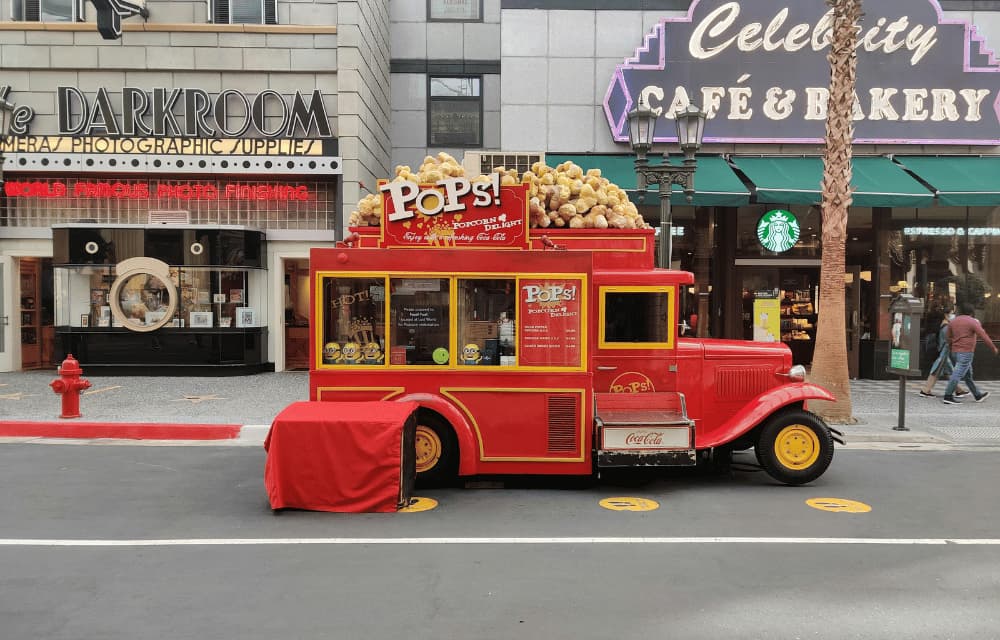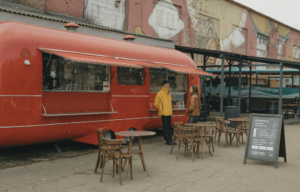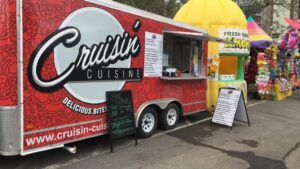Food Truck vs Food Trailer: Which one is best for you? Here you could check the complete guide help you to understand what’s greatly fit your new business idea. A food truck is a self-contained vehicle equipped with a kitchen, storage, and sometimes even seating space. You drive it to your location, park, and start serving.
But A food trailer is a non-motorized unit that must be towed by a separate vehicle. It contains all the kitchen equipment but no engine or driving components.
Starting a mobile food business is exciting—but one big decision can shape your entire journey: food truck or food trailer?
Food Truck: A Complete Guide
A food truck is a self-contained vehicle equipped with a kitchen, storage, and sometimes even seating space. You drive it to your location, park, and start serving.
It is a self-contained commercial kitchen that operates without external towing. A mobile restaurant on wheels that cooks, stores, and serves food directly to customers.
Key Specifications of a Standard Food Truck
While food trucks vary in design depending on cuisine and customization, here are the typical specs:
| Feature | Standard Specification |
| Length | 14 to 26 feet |
| Power Supply | Generator, propane, or shore power hookup |
| Fuel Type | Diesel or gasoline (depending on chassis) |
| Water System | Fresh & grey water tanks (30–50 gallons each) |
| Kitchen Equipment | Griddle, fryer, stove, prep table, fridge, sink |
| Ventilation | Commercial exhaust hood with fire suppression |
| Interior | Stainless steel surfaces, non-slip flooring |
| Service Window | Single or dual windows with awning |
| Permits | Vehicle license, food handling permits, health inspection certificates |
Business Models Best Suited for Food Trucks
1. Daily Route-Based Food Service
Perfect for:
- Industrial areas
- Business districts
- Schools and universities
Why? Food trucks can easily relocate during lunch hours and peak times, maximizing reach and revenue.
2. Pop-Up Restaurants & City Events
Ideal for:
- Street festivals
- Local markets
- Weekend food parks
Why? With a fast setup and teardown time, food trucks can operate at multiple events in a short span.

3. Private Catering on the Go
Used in:
- Corporate events
- Weddings and private parties
Why? Food trucks are mobile and self-contained, offering food service anywhere—even in remote venues.
4. Pilot Launch for Restaurant Concepts
Best for:
- Entrepreneurs testing a new menu
- Franchise testing before expansion
Why? A food truck allows you to test your product with real customers without committing to a full brick-and-mortar space.
5. Touring & Promotional Campaigns
Great for:
- Beverage and snack brands
- Product launches
Why? Brands can take the truck on a nationwide tour to promote products with real-time sampling and interaction.
Food Truck Pros & Cons:
Pros of Food Trucks
- Fully mobile: Easy to move to events, hotspots, or daily routes.
- Quick setup: Just park and start. No need for extra towing.
- Compact design: Everything is in one place, making operations smoother.
- Better for Urban Areas: Ideal for city streets where space is limited and maneuvering a trailer is difficult.
- Lower Theft Risk: A food truck is a single unit, harder to steal or tamper with compared to an unattached trailer.
Cons of Food Trucks
- Higher cost: Typically more expensive to purchase and maintain.
- Less space: Limited kitchen and storage space due to size.
- More maintenance: If the engine breaks down, your entire business is on hold.
Where Food Trucks Suit Best (Geographically):
| Location Type | Suitability Level | Reason |
| Urban downtowns | ⭐⭐⭐⭐⭐ | High foot traffic, easy parking |
| College campuses | ⭐⭐⭐⭐ | Hungry students, predictable meal times |
| Business parks | ⭐⭐⭐⭐ | Office lunch hours, quick service required |
| Event venues | ⭐⭐⭐⭐⭐ | High-volume service during short durations |
| Residential areas | ⭐⭐ | May need special zoning or HOA approval |
Food Trailer: What you need to know
A food trailer is a non-motorized unit that must be towed by a separate vehicle. It contains all the kitchen equipment but no engine or driving components.
In recent years, food trailers have become more popular due to their lower startup costs and larger interior space.
Key Specifications of a Standard Food Trailer
Food trailers come in a wide range of sizes and can be customized for different cuisines. Below are the general specifications:
| Feature | Standard Specification |
| Length | 10 to 30 feet (common sizes: 14′ – 20′) |
| Power Supply | Generator, propane, or shore power hookup |
| Water System | Fresh & grey water tanks (30–60 gallons) |
| Kitchen Equipment | Fryers, stoves, ovens, refrigerators, sinks |
| Ventilation | Commercial exhaust hood with fire suppression |
| Interior | Fully customizable; larger layout options |
| Axles | Single or tandem axles depending on size |
| Towing Requirement | Pickup truck or SUV (usually ½-ton+) |
Business Models Best Suited for Food Trailers
1. Event-Based Food Service
Perfect for:
- Music festivals
- County fairs
- Stadium events
Why? Trailers can be hauled in, parked, and operated over multi-day events with stable, high-volume service.
2. Semi-Permanent or Long-Term Locations

Ideal for:
- Food courts
- Breweries
- Commercial parking lots
Why? Food trailers are perfect for businesses that don’t need to move daily and can stay set up for weeks or months.
3. Catering & Private Functions
Used in:
- Weddings
- Corporate events
- Community fundraisers
Why? Large food trailers can handle multiple menu items and larger crowds, making them great for catering.
4. Shared Food Concepts or Commissary Models
Best for:
- Multiple vendors sharing one kitchen
- Food parks and co-branded services
Why? The extra space allows teams to operate side-by-side or switch menus between shifts.
Where Food Trailers Suit Best (Geographically)
| Location Type | Suitability Level | Reason |
| Large event grounds | ⭐⭐⭐⭐⭐ | Plenty of parking and space for setup |
| Suburbs / towns | ⭐⭐⭐⭐ | Great for long-term vending locations |
| Rural areas | ⭐⭐⭐⭐ | Low zoning restrictions, space to park |
| Downtown areas | ⭐⭐ | Harder to park and tow in congested areas |
Pros and Cons for Food Trailer:
Pros of Food Trailers
- Lower cost: Usually more affordable than food trucks.
- More space: Extra room for equipment and staff due to larger layout.
- Separate towing vehicle: If the trailer breaks down, your towing vehicle is still usable and vice versa.
- Ideal for Stationary Setup: Food trailers can be stationed at semi-permanent spots like festivals, event grounds, or commercial lots.
- Greater Customization Flexibility: Due to the open floor plans, trailers are easier to customize with dual windows, storage rooms, or specialty equipment.
Cons of Food Trailers
- Less mobile: Not as easy to move around frequently.
- Requires towing: Need a capable towing vehicle and more time for setup.
- Zoning challenges: Some cities have more restrictions on trailers than trucks.
Food Truck vs Food Trailer: A Comparison Between Both:
Cost Comparison
| Feature | Food Truck | Food Trailer |
| Starting Cost | $50,000 – $150,000 | $20,000 – $100,000 |
| Maintenance Cost | Higher (engine & kitchen) | Lower (kitchen only) |
| Licensing | One vehicle license | Separate for trailer + towing vehicle |
Tip: If you’re starting on a budget, a food trailer might be a better option. But if mobility and flexibility are crucial, go with a food truck.
Licensing and Regulations
Both vehicles need to follow local health, safety, and zoning rules. But keep in mind:
- Food trucks typically require fewer permits (just one license for the truck).
- Food trailers might need multiple permits—for the trailer and the towing vehicle.
Always check your local city or state requirements before investing.
Setup and Daily Workflow
- Food trucks are easier to set up daily—just park, power up, and go.
- Food trailers take more time—connect the trailer, tow it, unhook, stabilize, and then operate.
If your schedule is tight and you’re serving multiple locations daily, a food truck saves time.
Which One is Right for You?
Ask yourself:
- Do you want to move frequently? → Go with a food truck
- Need more space for a team or equipment? → Consider a food trailer
- Working with a tight budget? → A trailer might be the way to start
- Looking for quick setup and easy operation? → A truck is easier to handle
Conclusion
Food Truck vs Food Trailer: Both are excellent ways to start a mobile food business, but the right choice depends on your goals, budget, and business style.
If you want maximum mobility and minimal daily setup—choose a food truck.
If you need more space and are okay with a semi-permanent setup—go for a food trailer. Whichever you choose, make sure it’s professionally built, legally compliant, and tailored to your cuisine.







